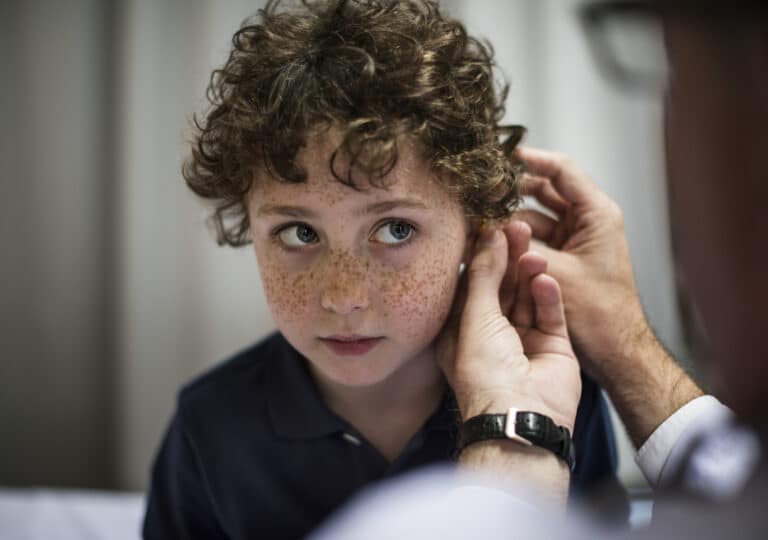High-frequency hearing loss is difficulty in hearing high-pitched sounds. It’s typically caused by damage to the hair cells in the inner ear and often leads to difficulty in understanding fast speech. It can occur at any age and is most common among older adults. However, one study showed as many as 14.2% of children within the study who use portable music players had high-frequency hearing loss.
High-frequency hearing loss in a child may be difficult to notice because a child can often hear but may be missing parts of speech. Children may face difficulties in several situations and even display inattentive behavior in social situations because they cannot hear.
What To Look For

Signs a child may have high-frequency hearing loss include:
- Difficulty hearing certain word distinctions: High-frequency hearing loss can make it difficult to hear consonant sounds. Consonant sounds typically include possessives and plurals and can denote tenses. Missing this information is difficult for a child because they don’t have the language experience and context an adult may have to fill in the blanks.
- Difficulty hearing with background noise: Children with high-frequency hearing loss may struggle with hearing in places like the classroom or Centennial Park playground because high-frequency hearing loss makes it difficult to hear with a lot of background noise.
- Struggles with listening at the end of the day: Children with high-frequency hearing loss may feel tired at the end of the day because of the additional energy they need to expend to listen. A child may need time to rest at the end of a school day before beginning new activities.
A child with high-frequency hearing loss may experience speech delays. High-frequency hearing loss can also be identified via a hearing test, making regular hearing exams essential. Once diagnosed, it’s helpful to have a support system set up at home and school.
Ways a child with high-frequency hearing loss can be supported include:
- Monitoring existing hearing by protecting ears from loud noises. Limit headphone time and encourage earplugs in situations like performing yard work or attending concerts.
- Encourage the child to ask for repetition when needed.
- Consider speech and language evaluation and therapy to ensure language development.
- Help the child to face a speaker during conversation whenever possible. Gain the child’s attention before beginning to speak. Don’t attempt to carry out conversations from a different room by yelling.
- Reduce background noises like the TV or music during conversation.
A child with high-frequency hearing loss may be a good candidate for hearing aids. Hearing aids can amplify speech sounds and ease their school experience and social interactions. Seeing a hearing specialist is a great first step when considering what treatment options are necessary and available.
To learn more about healthy hearing for adults or children, consider scheduling an appointment with Gulf Coast Audiology today.
